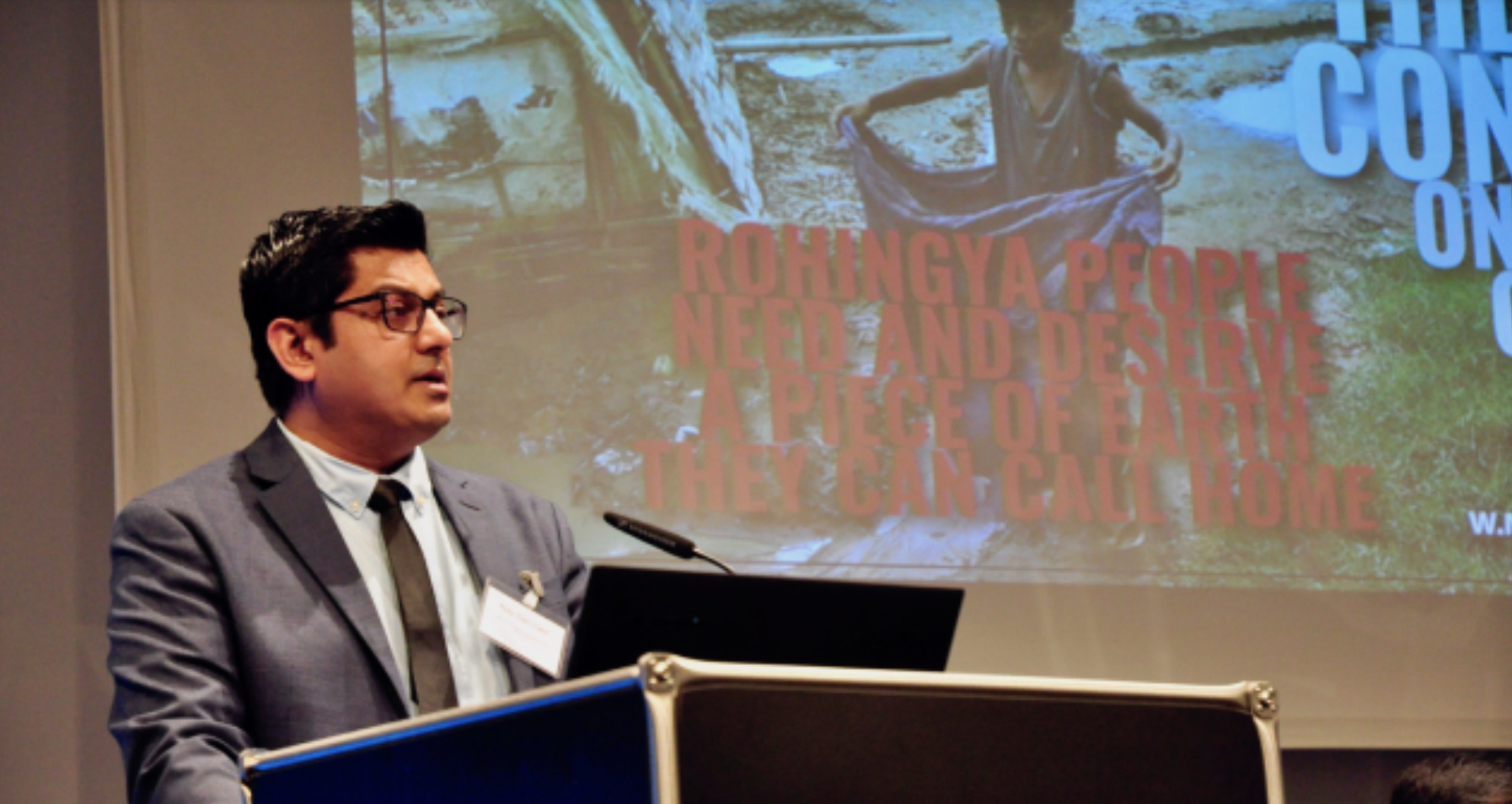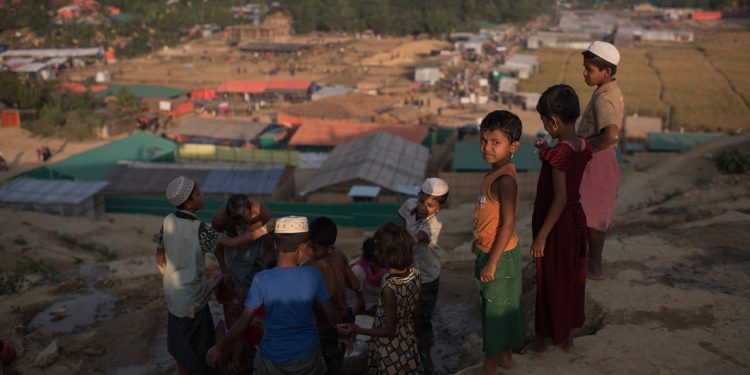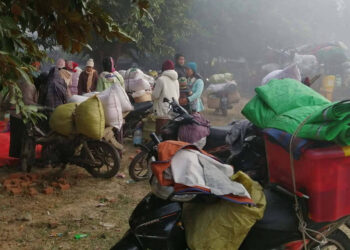U Nay San Lwin is the co-founder of the Germany-based Free Rohingya Coalition, but better known on social media as Ro Nay San Lwin. Known for his Rohingya activism, he has described the Arakan Rohingya Salvation Army (ARSA) as criminals who kill their own kind. U Nay San Lwin talked recently to The Irrawaddy about the Spring Revolution against the military dictatorship and the conflict in Rakhine State.

What is your opinion of the Spring Revolution and the civilian National Unity Government (NUG)?
The revolutionary spirit of young people in Myanmar and their desire to reform the country deserves praise. I’m proud that young people are this active after almost two years of revolution. If they keep on like this, I think the country will be liberated one day.
About the leadership of the NUG, after the NUG was formed it released a statement describing its policy towards the Rohingya people. Although it has some weakness in recognizing the identity of the Rohingya, I welcome the NUG statement.
The NUG has yet to cooperate with the Rohingya. About the genocide, the United States officially recognized [the Myanmar military’s 2017 operation against the Rohingya] as genocide and the case is also being heard at the International Court of Justice. What will be the NUG’s position? It has not recognized it as genocide. When will it recognize it? Rather than cooperating only when necessary, the NUG should cooperate extensively with Rohingya leaders and activists to find a solution to the issue.
How will the Rohingya co-exist with the Rakhine people? What are the views of the Rohingya on the Arakan Army (AA) and the conflict in Rakhine?
Rakhine ethnic people make up the majority in Rakhine. And the Rohingya make up the second largest population. The Rohingya were officially recognized as one of Myanmar’s ethnic groups after independence and granted full ethnic rights. There were different views about this policy after [military dictator] U Ne Win seized power. Rakhine scholars and politicians were involved in designing and backing the 1982 Citizenship Law [which denies the Rohingya citizenship]. [Rohingya] were not happy, but there were no attacks.
[Sectarian strife] was created under U Thein Sein’s government to distract public attention from the [China-backed] oil and gas pipeline project in Kyaukphyu in 2012. There were casualties. The two communities became segregated. But, lately, the two communities are engaging again.
Rakhine people and Rohingya people have reached a higher level of understanding. Previously, Rohingya students could not attend Sittwe University. But now some 200 to 300 Rohingya students are studying there. Rohingya and Rakhine student unions are cooperating. Previously, Rohingya people could not leave their camps to do shopping. But now there is trade between the two communities. So things have improved a lot. But there are still vague policies.
We don’t know about the fate of Rohingya when the AA takes control of all Rakhine State and declares independence. Generally, they [the AA] have been saying that there will be full human rights and citizenship rights for Rohingya. But the situation on the ground is a little different from what the AA leaders say.
Developments [in relations between Rakhine and Rohingya] youths are quite encouraging. But there is room for engagement between the leadership of the two sides. We will wait and see how the leaders of the two sides resolve things. We must try.
What is your view on ARSA? There are suspicions that ARSA has ties to international terrorist organizations.
About ARSA, their first operation took place on October 9, 2016. They attacked border police outposts in northern Maungdaw and Rathedaung townships then. About their coordinated attacks on 30 border guard outposts and police stations in 2017, I doubt that they are really that strong or have the weapons to carry out attacks on that scale. I think it was an excuse [for the Myanmar military to persecute the Rohingya]. In fact, Rohingya people were forced out of their homes. It was not a coincidence. When I went to Bangladesh, I met residents from every village and inquired what happened. The things that the military claimed happened didn’t occur. The attacks occurred just one day after an advisory commission led by former United Nations chief Kofi Annan issued its report [which provides a long-term solution for Rakhine State]. It couldn’t be a coincidence.
There are alleged ties between the Myanmar military and ARSA. I have suspicions that they have ties, but I have no evidence. And ARSA has started to target people in the refugee camps in Bangladesh who oppose them and are advocating for Rohingya repatriation.
ARSA assassinated our comrade who had become a community leader at the refugee camps. We have monitored the activities of ARSA in the refugee camps since 2016. We found that they are not working in the interests of the Rohingya people. There are also allegations that ARSA is involved in drug smuggling. If they are really working for the liberation of the Rohingya people, they wouldn’t be killing Rohingya people in the refugee camps.
They have gone too far. I have assessed their policies and I can’t accept them. The Rohingya community can’t accept the ARSA. We have officially told the world that ARSA does not represent the Rohingya community.
Are Rohingya people hopeful that they will be able to return to their homes in Rakhine once the military dictatorship is overthrown?
Frankly speaking, we didn’t have hope in the past. Although the NLD government was in office, the military was in fact in control and the [NLD government] just echoed the military. So there was no hope then and there is no hope now either.
If the NUG is consistent with its policies and returns to power as a legitimate government, there will be hope.
After the coup last year, Min Aung Hlaing talked about repatriating Rohingya people and also sent a letter to the Bangladesh government about it. But the military then engaged in fierce fighting with the AA to create the impression that Rakhine is not safe and that repatriation is impossible.
The military committed genocide against the Rohingya and its claim that it is now working to bring them back deceives no one. If it really wants to mend its ways, there are more than 130,000 internally displaced persons currently in camps in Sittwe [the Rakhine capital] and it must arrange for them to return to their homes.
The military must show clearly how it has rebuilt villages for refugees to come back to. And it must also clearly state if they can enjoy citizenship rights. The regime is only talking the talk, and there is no hope for us. We can do nothing if the whole country is ruined.
We are part of this country and we will do what we can to help the success of the revolution and a return to civilian administration. We have been advocating and finding ways to build a new federal, democratic country which guarantees equal rights for all the minorities, not just the Rohingya, when a civilian administration is restored. We are not leading the efforts, but only assisting the people leading those efforts. Only when peace is restored to the country, will we know the fate of our Rohingya people.

















